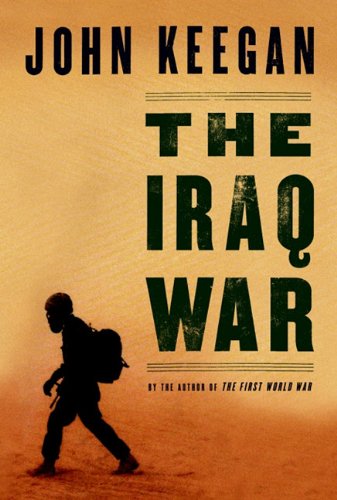
The Iraq War
فرمت کتاب
ebook
تاریخ انتشار
2004
نویسنده
Charlotte P. Barnerنویسنده
Charlotte P. Barnerنویسنده
John Keeganشابک
9781400043446
کتاب های مرتبط
- اطلاعات
- نقد و بررسی
- دیدگاه کاربران
نقد و بررسی

May 17, 2004
Ubiquitous military historian Keegan (Intelligence in War
) offers a reportage-based account of a "mysterious war." Keegan addresses the war's anomalies—200,000 soldiers took a country of almost 30 million in three weeks; the war's justification (WMD) never materialized; the Iraqi army "melted away" and the populace tried only to stay out of the way—by surveying the post–World War I origins of Iraq, Saddam's rise to power, the nature of his rule and his external ambitions. The result is a work with broader scope than Murray and Scales's The
Iraq
War
(2003), and one that makes a case for the war as justified in moral, legal and practical contexts. Saddam emerges, predictably enough, as a particularly nasty regional despot and the architect of his own destruction through his intransigent failure to satisfy the demands of an increasingly frustrated international community. Keegan divides his account of the campaign itself into "American" and "British" chapters, and he praises the skill of the planners and commanders of both armed forces. His accounts of British operations in the Shiite south and the U.S. drive on Baghdad affirm the high morale and fighting power of the troops involved. Keegan in particular demonstrates the U.S. mastery of mechanized maneuver war, but underplays the problems of control and pacification that have been making headlines since the turn of the year. Agent, Gillon Aitken Associates, U.K.

May 15, 2004
Keegan has long been revered as a brilliant military historian with a gift for recounting the individual experiences of battle while simultaneously explaining broader strategic objectives. However, this compact and superbly written work is not strictly a military history of "Operation Iraqi Freedom." Approximately half of the narrative focuses on the creation and evolution of the modern Iraqi state in the twentieth century. Keegan makes the compelling argument that Iraq, traditionally divided along religious, ethnic, and tribal lines, has never been a nation in the usually accepted sense of the term. The unity of Iraq has been maintained at gunpoint. The portrait here of Hussein is both fascinating and chilling, the author capturing the aura of paranoia and grandiose fantasy with which he surrounded himself. Keegan offers some tantalizing tidbits on the diplomatic maneuvers as Washington moved toward war, and the Bush administration strived to patch together a "coalition." He describes the war itself with his usual elan and skill, drawing striking differences between this campaign and the Gulf War. As Keegan shows, in some areas the Iraqi military virtually melted away. Unfortunately, as we now see on a daily basis, many of their small arms either went with them or fell into the hands of more committed fighters. Essential reading for understanding the ongoing conflict.(Reprinted with permission of Booklist, copyright 2004, American Library Association.)

























دیدگاه کاربران